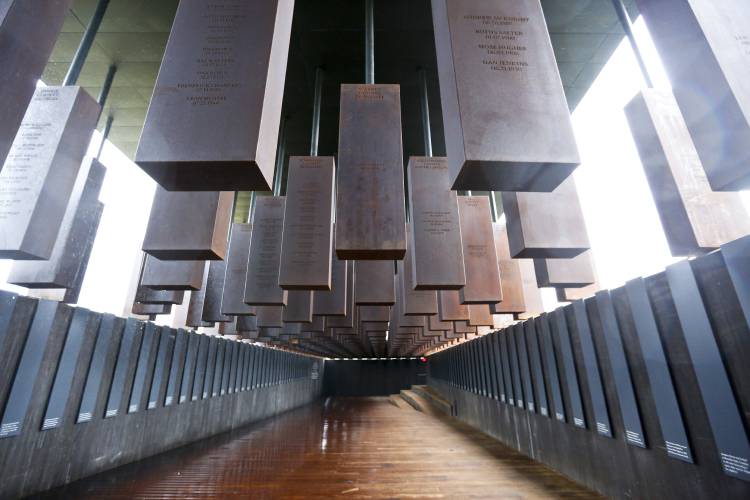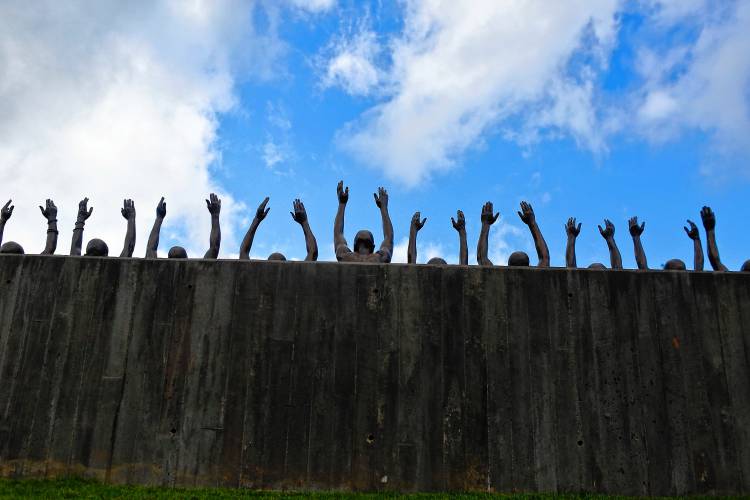Opinion: Live free and don’t hate: It’s time to stop the rise of hate groups in NH
| Published: 11-06-2024 7:00 AM |
Karishma Manzur, Ph.D. is a science writer living in Exeter. She volunteers with various groups, including the NH Coalition for a Just Peace in the Middle East which includes NH Veterans for Peace, VT/NH. Jewish Voice for Peace, NH Conf. of United Church of Christ, NH Peace Action, and several other organizations.
I recently asked several acquaintances why they were not outraged by Donald Trump’s hateful rhetoric against immigrants and other vulnerable groups. Some exonerated the words of hate (“He shouldn’t be taken too seriously”) and some felt protected from the hate (“He isn’t talking about me.”)
When I hear such responses, I feel compelled to adapt the words of German Pastor Martin Niemöller upon his release from a Nazi concentration camp:
First, they came for the Mexicans, and I did not speak out — because I was not a Mexican.
Then they came for the Jews, and I did not speak out — because I was not a Jew.
Then they came for the immigrants, and I did not speak out — because I was not an immigrant.
Then they came for me — and no one was left to speak for me.
Other than the descendants of the Native American peoples, we are a nation of immigrants. Whether our families arrived a few generations earlier or more recently, America is “a society of immigrants … with the fresh memory of old traditions … people eager to build a life for themselves.” We should heed the words of President John F. Kennedy and take pride in our nation.
Article continues after...
Yesterday's Most Read Articles
 New Hampshire providers brace for Medicaid changes that reach beyond healthcare
New Hampshire providers brace for Medicaid changes that reach beyond healthcare
 New England College expands $10,000-per-year offer to Concord, Bishop Brady graduates
New England College expands $10,000-per-year offer to Concord, Bishop Brady graduates
 Concord school leaders weigh the future of middle school project without state building aid
Concord school leaders weigh the future of middle school project without state building aid
 Truck collision on South Main Street in Concord diverts traffic
Truck collision on South Main Street in Concord diverts traffic
 Warner shot down a housing developer’s bid. New statewide zoning mandates could clear a path for proposals like it.
Warner shot down a housing developer’s bid. New statewide zoning mandates could clear a path for proposals like it.
Sadly, some candidates and those in higher office in the U.S. and in New Hampshire are demonizing “immigrants” and stoking nativist fears over perceived threats from immigrants.
“Immigrants” are now part of a growing list of entities who have been targets of hateful rhetoric, including Hispanics, Blacks, Asians, the FBI, Muslims, Jews, the LGBTQ+ community, transgender children, public school teachers, volunteer poll workers, and recently, meteorologists.
How can we, as a nation, laugh, tolerate, ignore, or agree with hatred directed at others?
At a Senate Judiciary Committee hearing about the rise in hate crimes, Sen. Dick Durbin (D-IL) said, “Free speech is sacred in America, but public officials on both sides of the aisles have a responsibility to not fan the flames of hatred. … This type of rhetoric can have deadly consequences.”
Let us take a moment to remember a few such “deadly” consequences that have taken place since the Civil War. Luther Holbert and over 4,400 Black people were killed in the brutal lynching campaign that terrorized Black residents for more than 80 years; their names are memorialized in the National Memorial for Peace and Justice in AL.
Paul Holy Track was a Native American boy who was hanged from a device used to hoist cattle carcasses by a group of men in ND. Tong Won and 17 other people were lynched by hundreds of white and Latino Americans during the Los Angeles Chinese massacre of 1871.
We should not forget Emmett Till, a Black boy who was abducted, tortured, and brutally murdered in MS. We should not forget Paramjit Kaur, who was fatally shot along with six others by a white supremacist in a Sikh temple in WI. We should not forget Heather Heyer killed in a deadly car attack by a white supremacist and neo-Nazi in Charlottesville, VA; Rose Mallinger, who was fatally shot along with ten others in Pittsburgh’s Tree of Life synagogue by an alt-right supporter; and 6-year-old Wadea Alfayoumi who died after being stabbed 26 times by his family’s landlord in IL for being a Palestinian American.
These are only a few names from a long list of Americans killed in hate crimes by other Americans. Our laws, norms, and teachings could not protect them from our ability to hate and hurt each other.
Here in New Hampshire, we have not been immune to the nationwide rise in anti-government and hate groups. The nonprofit Southern Poverty Law Center’s interactive Hate Map shows the presence of Proud Boys, Patriot Front, American Nazi Party, Moms for Liberty (in Rockingham County), Constitutional Party (in Auburn), Granitegrok (in Gilford), No Left Turn in Education (in Concord), Jihad Watch (in Manchester), and many others.
Hate groups exist because, at the least, we are silent or indifferent, and at the worst, we attend their events, join their mailing lists, donate our money, and promote their agendas.
We should take a moment to ask ourselves: What can we do to stop hate and prevent future tragedies?
We should question hate-filled speeches and ads that target vulnerable groups. Reject incitements to violence, which can sometimes be disguised as humor. Read and listen to different sources of information. Explore if biases exist in ourselves, places of worship, and community spaces. Talk to young people about acceptance, as bias is often learned at home.
Up until the last day of her life, Heather Heyer continued her efforts to stop the rise of hate in her hometown of Charlottesville. Her final message was, “If you are not outraged, you’re not paying attention.”










 Opinion: What Coolidge’s century-old decision can teach us today
Opinion: What Coolidge’s century-old decision can teach us today Opinion: The art of diplomacy
Opinion: The art of diplomacy Opinion: After Roe: Three years of resistance, care and community
Opinion: After Roe: Three years of resistance, care and community Opinion: Iran and Gaza: A U.S. foreign policy of barbarism
Opinion: Iran and Gaza: A U.S. foreign policy of barbarism
